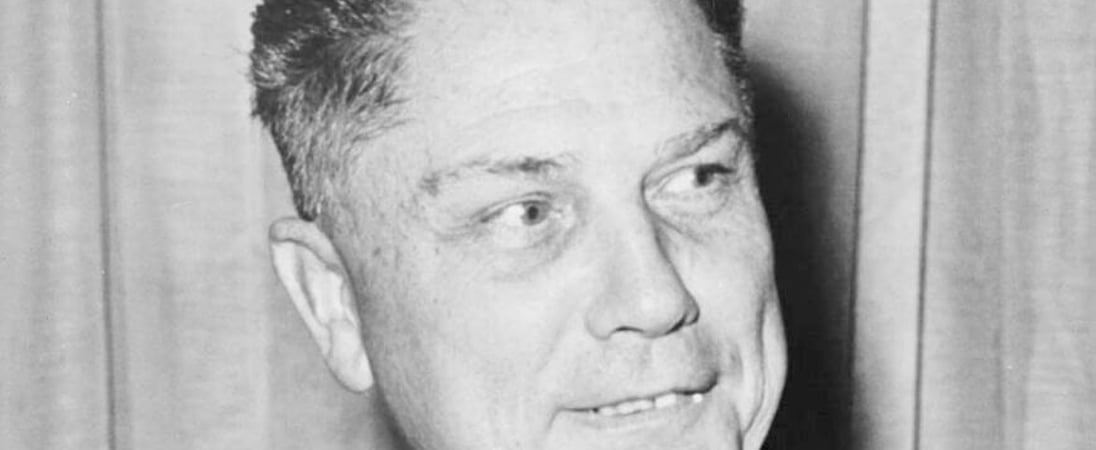
Jimmy Hoffa's birthday
Jimmy Hoffa, born on February 14, 1913, was a famous labor union leader in America. His life was marked by his strong commitment to workers’ rights.
Hoffa became a leading figure in the Teamsters union, growing its influence significantly. Despite his success, he faced legal troubles and controversy. His mysterious disappearance in 1975 remains unsolved, adding intrigue to his story.
Jimmy Hoffa’s Early Life
Jimmy Hoffa’s journey began in Brazil, Indiana. Born into a working-class family on February 14, 1913, he experienced a childhood steeped in humble beginnings.
His father, a coal miner, passed away when Jimmy was just seven years old. This tragedy forced the Hoffa family to face tough financial struggles.
Hoffa’s education was brief. He attended school only until the eighth grade. After leaving school, he started working to help support his family.
His early jobs were far from glamorous, involving manual labor in warehouses and on docks. These experiences, however, laid the foundation for his later career.
The young Hoffa quickly realized the challenges workers faced. He saw how they struggled for fair pay and safe working conditions.
These observations kindled a passion for workers’ rights in him. Even as a teenager, Hoffa began his journey in labor activism, showing early signs of his future leadership.
The Rise of Jimmy Hoffa: Triumphs and Achievements
Jimmy Hoffa’s climb to success began in the gritty world of labor unions. His charisma and dedication quickly made him stand out.
By the 1930s, Hoffa had risen through the International Brotherhood of Teamsters (IBT) ranks. His goal was clear: to unite all truck drivers under one organization.
Hoffa’s efforts paid off. He played a key role in the 1934 strike in Detroit, which was a turning point. This success put him on the map as a powerful labor leader. By 1952, he had become the vice-president of the Teamsters. His real triumph came in 1957 when he ascended to the union’s presidency.
Under Hoffa’s leadership, the Teamsters grew immensely. They became the largest and most powerful union in America.
Hoffa’s negotiations led to better wages and conditions for workers. He was known for his tough bargaining and his ability to get results.
Hoffa’s achievements extended beyond labor rights. He worked to modernize and expand the union’s activities. His vision included pension plans for workers, a revolutionary idea at the time. Hoffa’s legacy in labor history is marked by his commitment to improving the lives of American workers.
Interesting Facts About Jimmy Hoffa
Early Activism: At just 19, Hoffa helped organize his first labor strike, demonstrating his leadership skills from a young age.
National Fame: Hoffa’s work with the Teamsters catapulted him into national prominence, making him a well-known figure across the United States.
Innovative Strategies: Hoffa was famous for his innovative approach to union organization, including the use of “quickie strikes” and secondary boycotts.
Political Influence: His influence reached into politics; Hoffa had connections with prominent politicians and used these to advocate for labor laws.
Legal Battles: Hoffa faced numerous legal challenges and trials throughout his career, often related to his union activities.
Conviction and Imprisonment: In 1967, he was convicted of jury tampering, attempted bribery, and fraud, leading to a prison sentence.
Presidential Pardon: In 1971, President Richard Nixon commuted Hoffa’s prison sentence with the condition that he not engage in union activities for a set period.
Author: Hoffa co-authored a book titled “The Trials of Jimmy Hoffa,” which chronicles his legal battles and viewpoints.
Also on this date...
National Organ Donor Day
The selfless act of giving the gift of life can bring hope and healing to those in need. It's a remarkable legacy that transcends time and spreads compassion.
International Book Giving Day
Sharing the joy of reading can transport you to far-off lands, introduce you to new friends, and unlock endless possibilities.




